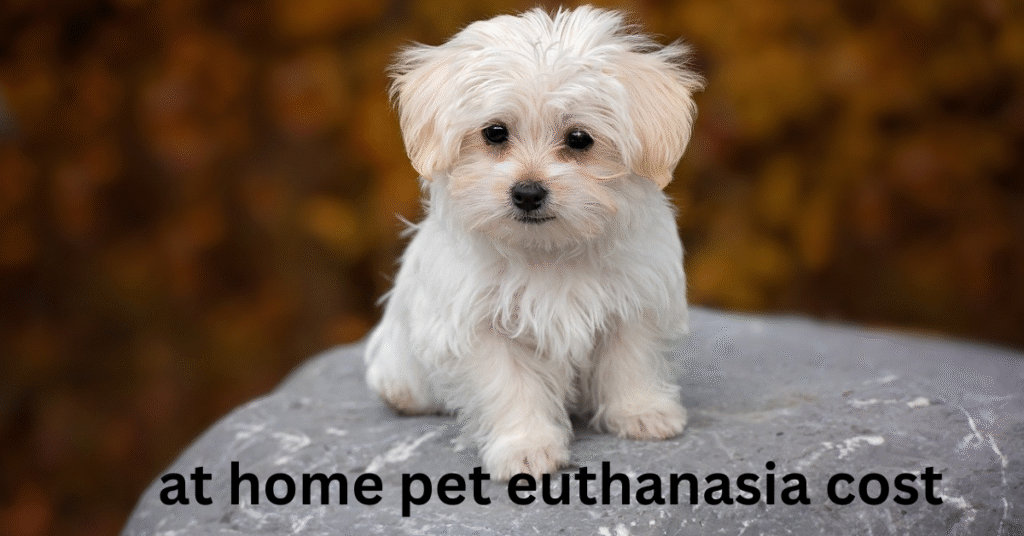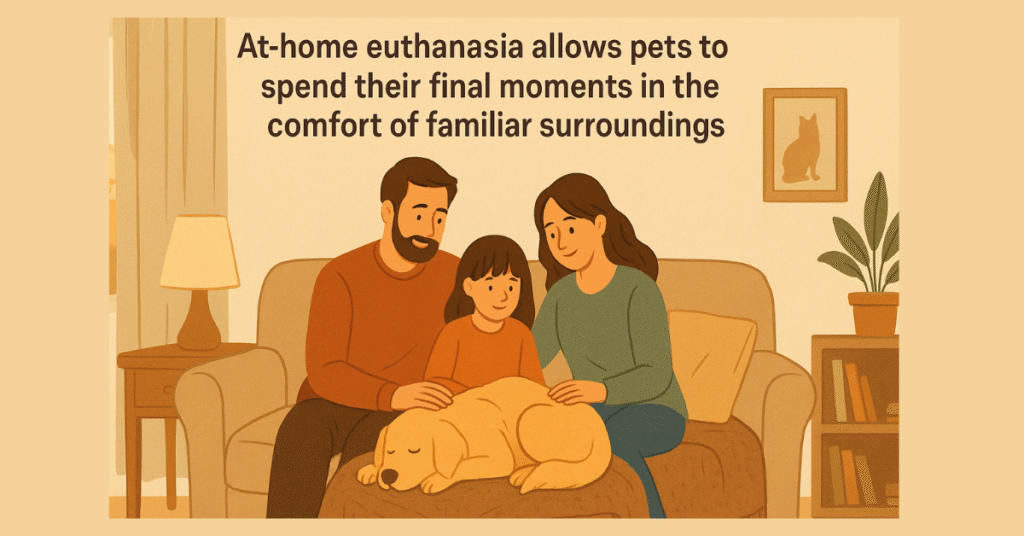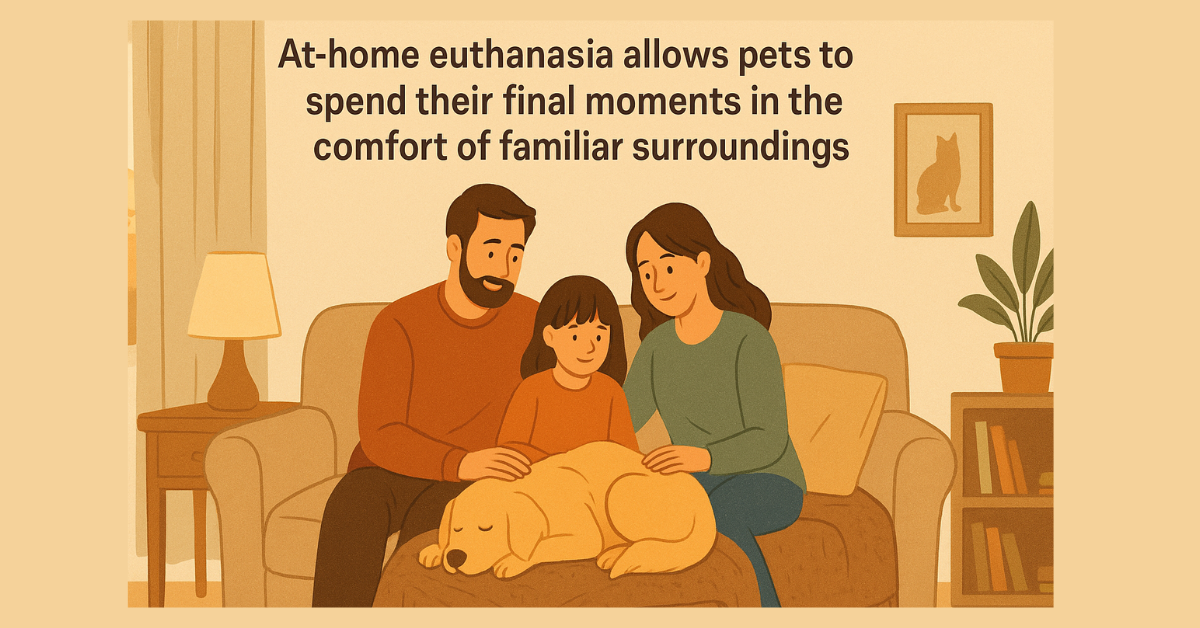Saying goodbye to a beloved pet is one of the most difficult and heartbreaking decisions any pet owner will ever face. When a companion animal reaches the end of their life, whether due to a terminal illness, advanced age, or a decline in their quality of life, the final act of love is often a peaceful farewell.
For many, the thought of this final moments happening in a sterile, clinical environment adds an extra layer of stress and sadness. This is where the compassionate option of at home pet euthanasia cost comes into consideration.
Table of Contents
At home pet euthanasia cost, as the name suggests, is a service where a veterinarian comes to your home to perform the procedure in the familiar and comfortable surroundings your pet loves most.

This allows for a more private and intimate goodbye, free from the anxieties of car rides, crowded waiting rooms, and strange clinic smells. It provides a way for you to honor your pet’s life in a peaceful, dignified manner.
While the emotional comfort of this choice is invaluable, practical considerations, particularly the cost, are a necessary part of the decision-making process. It’s a subject that many find difficult to discuss, but understanding the financial aspects upfront can help alleviate stress during an already emotionally taxing time.
This comprehensive guide will break down the average costs, the key factors that influence pricing, and provide a detailed comparison to help you make an informed decision that is right for your family and your cherished companion.
What Does At Home Pet Euthanasia Cost Really ?
The cost of at-home pet euthanasia varies widely across the United States, but it is generally a premium service compared to in-clinic options. The national average for an at-home euthanasia procedure is approximately $450, but the price can range from $350 to $900 or more, depending on a variety of factors. This base fee typically covers the veterinarian’s time, travel, and the necessary medications to ensure a peaceful passing.
When you contact a mobile veterinary service, the quoted price usually includes a few essential components. First and foremost, it covers the professional fee for the veterinarian to travel to your home. This is often a significant portion of the cost, as it accounts for their time and fuel. It also includes a quality-of-life assessment, where the vet will gently evaluate your pet’s condition and confirm that euthanasia is the most humane option.

The procedure itself involves two main injections. The first is a sedative or anesthetic administered to help your pet relax, fall into a deep sleep, and feel no pain. This step is crucial for a peaceful transition. Once the pet is fully sedated and comfortable, the final euthanasia solution is administered, which works quickly and painlessly to stop the heart.
The overall price is not a flat fee; it is influenced by several key factors. The most significant of these is geographical location. For example, a service in a major metropolitan area like Los Angeles or New York City will almost certainly cost more than the same service in a rural town in the Midwest. This is due to a higher cost of living, higher overhead for the business, and the increased demand for mobile veterinary services in densely populated areas.
Travel fees can also be a factor, with an additional charge if your location falls outside the vet’s standard service area. It is always wise to get a clear quote that includes all potential travel surcharges.
Another major cost driver is your pet’s size and weight. The amount of sedative and euthanasia solution required is directly proportional to the animal’s body mass. Therefore, a larger dog, such as a Great Dane or a Saint Bernard, will require a significantly higher dose of medication than a small dog or a cat. This difference in medication cost is a primary reason for the price variations. When you inquire about a quote, be sure to mention your pet’s weight to get the most accurate estimate.
Finally, the time of day and urgency of the appointment can impact the final cost. Most mobile vets have standard business hours, and scheduling an appointment during a weekend, evening, or holiday will typically incur an additional “after-hours” or emergency fee.
These surcharges can add anywhere from $50 to over $150 to the total cost. If your pet’s condition allows, planning the appointment during standard hours can help you manage the expense. While it may not always be possible, a planned, scheduled goodbye can offer both financial and emotional peace of mind.
Beyond the Procedure – Understanding Aftercare Costs
The financial journey of saying goodbye to a pet doesn’t necessarily end with the euthanasia procedure itself. Once your pet has passed peacefully, you will need to decide on their final arrangements. The aftercare options can add significantly to the total cost, and it is important to be prepared for these conversations. Most mobile veterinarians will discuss these options with you beforehand, and many can assist with the logistics of transporting your pet for their chosen aftercare service.
The most common aftercare choice is cremation, which comes in two primary forms: group and private.
Option 1: Group (Communal) Cremation
In a group or communal cremation, your pet is cremated alongside other deceased pets. This is generally the most economical cremation option. The remains of the animals are co-mingled, and the ashes are not returned to individual families. Instead, the crematorium may scatter the ashes in a communal garden or a designated natural area.
The cost for this service typically starts around $50 and can increase based on the pet’s size and the service provider. For many families, this is a respectful and affordable way to handle their pet’s remains while finding closure.
Option 2: Private (Individual) Cremation
Private cremation ensures that your pet is cremated on their own, allowing for their individual ashes to be returned to you. This is a much more personal option and is reflected in the higher cost. The price for private cremation often starts around $100 and can range much higher, primarily depending on the pet’s weight and the type of container chosen for the ashes. Your veterinarian or the crematory service will provide you with a selection of urns and memorial boxes.
The emotional comfort of having your pet’s ashes returned to you, perhaps to be kept in your home or scattered in a special place, is a primary reason many families choose this path. The cost of a private cremation often includes a simple urn, but you may choose to upgrade to a more elaborate one for an additional fee.
Additionally, many services offer special keepsakes, such as a clay paw print or a lock of fur. These small, tangible memories can be a source of great comfort and healing. While some of these might be included in a premium package, others are often offered as optional add-ons, so it’s important to inquire about the pricing for these special mementos.
Option 3: Home Burial
If you have the space and the legal permission to do so, burying your pet at home is another viable aftercare option. It is typically the most cost-effective choice, as it doesn’t involve any additional fees from the veterinary service. However, it is absolutely essential to check local and municipal ordinances regarding pet burial, as regulations can vary widely.
Some areas have specific rules about depth, proximity to water sources, and other environmental factors. For many, a home burial provides a sense of peace and a way to keep their pet close, creating a personal memorial in a garden or a favorite spot in the yard.
Option 4: Pet Cemetery Burial
For those who do not have the option of a home burial or prefer a formal resting place, burial in a pet cemetery is an alternative. This is generally the most expensive aftercare option, with costs that can range from several hundred to several thousand dollars.
The price depends on various factors, including the size of the plot, whether you choose a casket, the type of headstone or marker, and the location of the cemetery. While a significant financial investment, a pet cemetery offers a permanent, dedicated place for grieving and remembrance, much like a human cemetery.
At-Home vs. In-Clinic Euthanasia – A Comprehensive Cost Comparison
When considering the cost, it’s helpful to put at home pet euthanasia cost in perspective by comparing it to the more traditional in-clinic option. The average cost for a pet euthanasia procedure at a veterinary clinic is significantly lower, with a national average of around $120-$130. The price range for this service is typically between $100 and $250. This considerable price difference leads many to question why at-home services command a higher price tag.
| Service Type | Average Cost (USD) | Notes |
|---|---|---|
| In-clinic euthanasia | $100 – $250 | Lower cost, clinical setting |
| At-home euthanasia | $350 – $900+ | More personal, vet travels to you |
| Group cremation | $50 – $150 | Ashes not returned |
| Private cremation | $100 – $300+ | Ashes returned in urn |
| Pet cemetery burial | $500 – $2,500+ | Includes plot, marker, and burial fees |
The simple answer is that the cost reflects a fundamental difference in the value of the service. An in-clinic procedure is performed efficiently within the controlled environment of a hospital, with all the necessary equipment and staff readily available. The process is quick and clinical by design, which can be a comfort for some but may feel rushed for others.
The higher at home pet euthanasia cost is not a markup on the procedure itself but rather an investment in the surrounding experience. The primary reasons for the price difference include:
- Travel Time and Fuel Costs: The at-home vet’s fee includes the time and resources required to travel to your home. Unlike a clinic where pet owners come to them, the mobile vet is dedicating a block of time to a single appointment, which limits the number of patients they can see in a day.
- Undivided Attention: When a vet comes to your home, they are focused solely on you and your pet. There are no other patients to see or emergencies to attend to. This allows for a gentle, unhurried, and deeply personal experience.
- Privacy and Comfort: The ability to say goodbye in a private, familiar setting is the single greatest benefit of at-home euthanasia. You can choose your pet’s favorite spot—a warm blanket, a sunny patch of grass, or your lap. The absence of a stressful car ride and a cold clinic environment can make a world of difference for a sick or anxious animal.
- Convenience: For pets with mobility issues or those who are in significant pain, a car ride can be unbearable. At-home euthanasia eliminates this stress, allowing them to remain in comfort until the very end.
Ultimately, the choice between at-home and in-clinic euthanasia is a deeply personal one that requires balancing financial considerations with emotional needs. While the numbers may favor the clinic, the peace of mind, comfort, and dignified farewell offered by an at-home service are often considered priceless by those who have experienced it.
Navigating the Financial and Emotional Landscape
Making the decision to euthanize a pet is an immense emotional burden. When financial concerns are added to the mix, the stress can feel overwhelming. It’s crucial to approach this topic with an honest and open mindset, understanding that having these conversations is a sign of responsible pet ownership, not a lack of love.
Payment and Financial Planning
When you contact an at-home euthanasia service, don’t hesitate to ask for a clear, itemized quote upfront. This will help you understand exactly what you are paying for and avoid any unexpected fees. Most services accept major credit cards, and some may have a preference for cash or check.
For those who are concerned about the immediate financial impact, some mobile veterinary services and third-party financing companies like CareCredit offer payment plans that allow you to spread the cost out over time. It’s always a good idea to research these options in advance, if possible, so you have a plan in place when the time comes.
Financial Assistance Programs
If the cost of end-of-life care is a significant barrier, there are resources available that can help. Many animal shelters and humane societies offer low-cost or no-cost euthanasia services to the public. While these may not be an at-home option, they are often a compassionate and affordable alternative.
Additionally, there are a number of national and local non-profit organizations that provide financial assistance to pet owners for veterinary care, including end-of-life services. Searching online for “financial help for pet euthanasia” or “pet care assistance programs” in your area can yield valuable results.
Another crucial financial consideration is pet insurance. If you have a pet insurance policy, be sure to check the details of your coverage. Many plans will cover the cost of euthanasia when it is recommended by a licensed veterinarian for humane reasons.
Some policies may even offer reimbursement for cremation or burial fees. Having a clear understanding of what your policy covers can provide immense relief during a difficult time.
Emotional Support
Beyond the financial aspects, remember to prioritize your emotional well-being. The grief that comes with losing a pet is real and profound. Many at-home euthanasia services are designed with this in mind and may offer additional emotional support, such as a follow-up phone call or a list of grief counseling resources. It is okay to mourn and to seek help.
Many communities have pet loss support groups, and online forums and hotlines can connect you with people who understand what you are going through. Honoring your emotions is a vital part of the healing process.
Final Considerations and How to Find the Right Provider
Finding the right mobile veterinarian for this final step is just as important as the decision itself. A good place to start your search is by asking for a referral from your regular veterinarian, as they may have a network of trusted mobile vets they work with. You can also perform a simple online search for “at home pet euthanasia cost near me.”
Once you have a few potential providers, it is crucial to ask specific questions to ensure you find a service that aligns with your needs. A quick phone call can provide you with a great deal of information and peace of mind. Here are a few key questions to ask:
- What is your all-inclusive fee for my pet’s weight?
- Are there any additional travel costs, and if so, how are they calculated?
- What aftercare options do you offer, and what are their specific costs?
- How quickly can you schedule an appointment, and what are the fees for after-hours or emergency appointments?
- Can you tell me about the procedure and what to expect?
Preparing for the day of the appointment can help the process feel more controlled and peaceful. You can choose a favorite blanket, bed, or a comfortable spot in the house or yard. Some families choose to play music, light candles, or share favorite memories aloud.
You can also have a favorite treat or a special meal ready for your pet to enjoy beforehand. The veterinarian will guide you through the process, allowing you to be present and to say a gentle goodbye. Knowing what to expect can help you focus on your pet and the loving act you are providing.
Choosing a Loving and Peaceful Goodbye
The decision to provide at home pet euthanasia cost is a deeply personal act of love and kindness. It prioritizes your pet’s comfort and allows them to pass peacefully in the place where they feel safest and most loved. While it is a more costly option than a clinic visit, the financial investment often pales in comparison to the emotional value of a peaceful, private, and dignified goodbye.
This guide has aimed to demystify the costs associated with this service, from the base procedure to the various aftercare options. By understanding the factors that influence pricing—such as location, pet size, and urgency—and exploring financial assistance programs, you can navigate this difficult time with confidence and grace.
Ultimately, the goal is not to dwell on the cost but to ensure that your beloved companion’s final moments are filled with peace, comfort, and the profound love of their family.
Q1: How much does at home pet euthanasia cost?
On average, between $350 and $900, depending on location, pet size, and time of appointment.
Q2: Why is at home pet euthanasia cost 1/ more expensive than in-clinic?
It covers travel, medications, and private, unhurried care in your pet’s favorite place.
Q3: Does pet insurance cover euthanasia?
Yes, many policies cover euthanasia recommended by a vet. Some also cover cremation.
Q4: Can I bury my pet at home?
Yes, if local laws allow. Always check regulations for depth and location.
